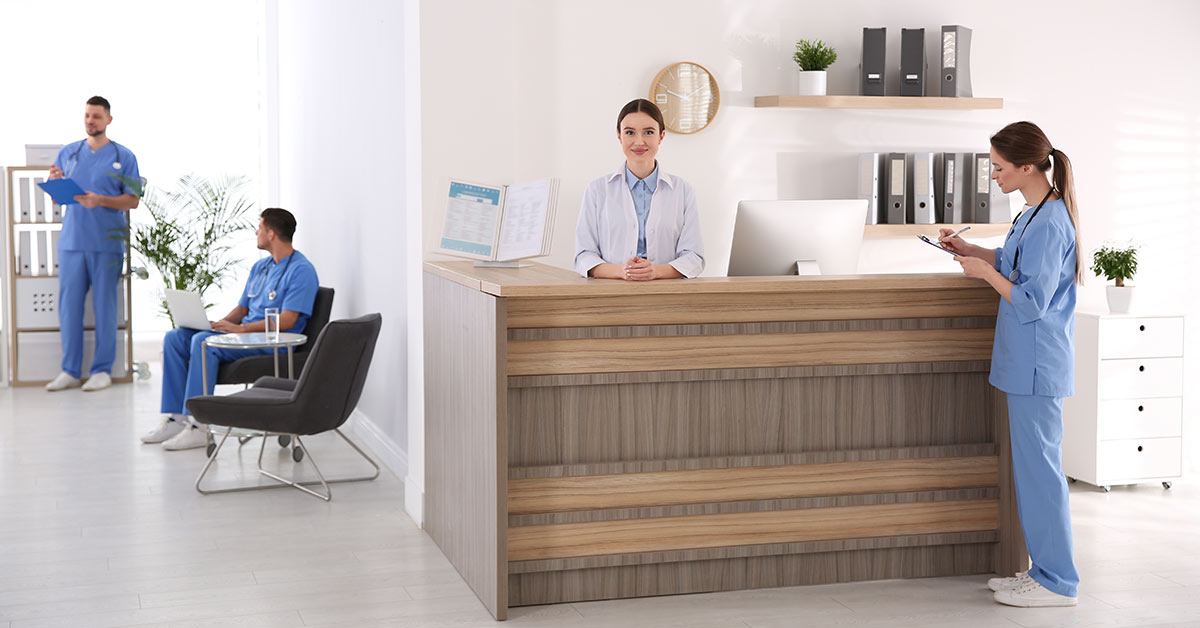07 Jul 2023
How to become a Health Administrator
Are you a highly organised individual with a desire to pursue a career in healthcare? If so, then working as a Health Administrator, or Medical Administrator, could be the perfect path for you!
In this article we’ll run you through the day-to-day of this highly in-demand role, the skills you’ll need, as well as explaining how to become a Health Administrator, so you can make the best decision for your future.

What Is Healthcare Administration
Health Administration plays an incredibly important role in any medical or healthcare setting – it keeps the ‘behind the scenes’ of things running smoothly! It’s simply a broad term for the management of all the non-clinical tasks that go into operating a healthcare or medical provider.
What do Health Administrators do?
So now you’ve got an idea of what healthcare administration is, you might still be wondering, ‘but what do Health Administrators do?’ No need to worry! We’ll walk you through everything you need to know about daily life in Health Administration.
Healthcare Administrators are responsible for managing, planning, and organising the day-to-day operations for healthcare providers, including (but not limited to) GP clinics and hospitals. When working in health administration, you’ll mainly interact with healthcare professionals and patients.
Some of the tasks and duties you’ll be doing each day could include:
Reception duties
In your medical administration career, you may find yourself working in a receptionist role, or in some smaller practices, your role as Health Administrator may be combined with reception duties. These duties include welcoming patients and visitors, answering the telephone, tending to any requests or enquiries, scheduling appointments and keeping them on track.
Assisting patients with completing necessary forms
Filling out forms can be overwhelming or difficult for many patients. To make it as painless as possible, you’ll help them make sure they fill out the necessary information correctly, as well as checking that current information in the system is accurate and up to date.

Keeping a clean, calm and well-maintained reception area
This could include distributing maintenance tasks to staff, communicating issues to healthcare professionals, and helping to ease patients’ distress.
Processing bill procedures and payments
You’ll communicate with patients, suppliers, and healthcare professionals to ensure bills are paid and records are kept in an organised manner.
Monitoring and ordering supplies
Without the appropriate supplies, things will grind to a halt. You’ll be making sure that stationary and medical supplies are always well-stocked.
Monitoring budgets
You might keep an eye on expenses, inventory and operational bills to ensure that the healthcare facility is running within its means and communicate with higher management when it’s not.
Booking and organising staff and doctor meetings
When meetings are needed, you’ll communicate with your colleagues to create meetings according to everyone’s schedules.
Communicate relevant policy or procedural changes with staff
Whether it’s a dress policy change, or a new procedure for booking appointments, your colleagues will need to know! It’s up to you to pass on that important information, make sure everything is well-understood and clear up any concerns.
Faxing, scanning, filing, mailing and typing documents
Touch typing is your new best friend! You’ll be staying on top of all kinds of documents and ensuring they’re kept safe and well-organised or are delivered to the correct persons on time.
Maintaining patient records, with strict adherence to information confidentiality
Again, you’ll want to make sure patient records are safe and well-organised, and most importantly, that they’re kept confidential. This means always following strict guidelines.

Essential skills for Medical Administrators
When you’re working in health administration, you’re expected to complete a wide variety of medical admin tasks. Here’s some of the essential healthcare administration skills you’ll need to succeed if you want to work in this role:
Organisation
Time management
Communication
Leadership
Computer skills
Interpersonal skills
Health Administration qualifications
If you want to know how to become a Healthcare Administrator, the only way there is through gaining a nationally recognised qualification. Through your studies, you’ll learn everything you need to know and gain invaluable experience to put your best foot forward as soon as you start.
There are two main health administration courses you can acquire. You can begin with a Certificate III in Health Administration or continue your studies with a Certificate IV.
Certificate III in Health Administration
The Certificate III in Health Administration will teach you the fundamental skills to maintain client and financial records and manage information and resources. With the Certificate III, you’ll be qualified to work in receptionist and general health administration roles.
Certificate IV in Health Administration
If you want to reach for higher-level positions, the Certificate IV in Health Administration is the way to go. You’ll learn more in-depth strategies, compliance regulations, human resources skills and become a strong contender for leadership roles that bring more responsibility and higher salaries.
How long does it take to become a Health Administrator
From the start of your Certificate III in Health Administration, you could be working in your first role within 12 months. In short – not a long time, in the grand scheme of things!
Health Administrator salary
So, working in health administration is sounding good so far, but how much do they earn?
According to the Australian Goverment’s Labour Market Insights, on average, full-time Health Administrators in Australia earn $2,339 per week before tax.
That’s much higher than the average earnings of all jobs in Australia, which is $1,593.
Is Healthcare Administration a good career choice?
At this stage, everything might be looking great – the duties are suited to you, the salary is great, but you may be thinking to yourself ‘Is healthcare administration a good career choice?’
The truth of the matter is the health administration career outlook is a very good one. With an ageing population, immigration and growing population sizes, there’s plenty of demand for healthcare staff, including Healthcare and Medical Administrators.
You could find yourself working in all types of medical administration environments, from hospitals and GP or physical therapy clinics to residential care facilities.
Ready to take the first steps? Start your new career in health administration with Foundation Education today. Call 1300 616 197.
Get in touch with us today.

Proud member of

Funding
© Foundation Education | RTO Number 22557
